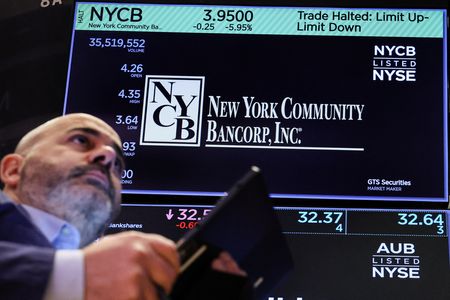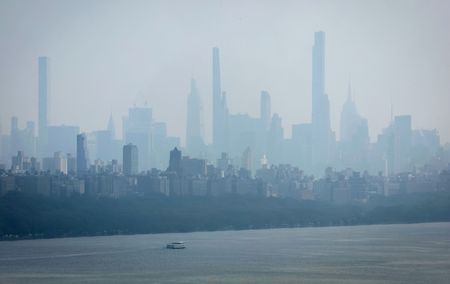By Manya Saini and Niket Nishant
(Reuters) -Embattled New York Community Bancorp faced its third credit-rating cut on Thursday while default worries from exposure to the beleaguered U.S. commercial real estate (CRE) took its toll on lenders in Europe and Asia.
Morningstar DBRS on Thursday downgraded NYCB’s credit rating due to “outsized” exposure to CRE, which the lender has pledged to reduce in the coming months. Rating agencies Fitch and Moody’s have already cut their ratings.
The bank’s shares were recently down 7%. They have fallen around 60% since last week, when the lender posted a surprise fourth-quarter loss and cut its dividend to deal with tough regulations.
“Liquidity appears sufficient, but given the bank failures last spring, we remain cautious given that the adverse headline risk, including a significant decline in NYCB’s stock price, could eventually spook customer and depositor confidence,” Morningstar DBRS said.
The bank’s management has tried to bolster investor confidence. NYCB’s newly appointed executive chairman Alessandro DiNello on Wednesday said the bank will consider the sale of loans in its CRE portfolio or let them run off the balance sheet naturally.
If needed, the lender would also shrink its balance sheet by selling non-core assets to bolster its common equity tier 1 ratio, a key measure of financial strength.
Some analysts have been encouraged by the bank’s recent messaging.
“Announcements on strategic priorities and progress thus far are positive and have helped provide some transparency,” wrote Bernard von-Gizycki of Deutsche Bank, calling the updates “a step in the right direction.”
Others, however, saw the potential for more pain in the sector. Analysts have for months warned that CRE-tied borrowers are at risk of defaulting on loans due to high interest rates and low occupancies.
“There are certainly elements that are specific to NYCB, but there are also elements that are reflective of the broader risks in the banking system,” said Steve Lynch, vice president and analyst with Moody’s Investors Service.
“Negative events at one bank can negatively impact confidence sensitivity in the sector and spread to other banks that may have either similar risks,” he said.
The KBW Regional Banking index was up 0.2% on Thursday.
The week-long sell-off in NYCB shares has soured sentiment on banks both in the U.S. and abroad while stirring worries over global contagion from CRE exposure.
Germany’s Deutsche Pfandbriefbank (PBB), whose 15% of total loans is tied to the CRE sector, called the situation “the greatest real estate crisis since the financial crisis”. The lender said it has enough funds to cope with a downturn in the real estate segment, even as its shares and bonds fell again. In Asia, shares of Japan’s Aozora Bank pared losses after falling to a three-year low last week as 6.6% of the bank’s loan portfolio was exposed to office real estate in the United States.
In the U.S., however, there was little evidence that banking worries were denting confidence in the broader stock market. The S&P 500 was unchanged on Thursday after hitting a fresh record high the day before.
U.S. Treasury Secretary Janet Yellen said on Thursday she expects additional stress on banks and some financial losses from weakness in the U.S. commercial real estate market, but that banking regulators are working with banks to address these risks.
Last year’s banking woes showed regulators and central banks have the tools to prevent a systemic crisis and would be quick to act if conditions worsen, said Mohit Kumar, chief economist, Europe, for Jefferies.
“While we cannot rule out more concerns emerging over individual names, we do not think that there is a systemic crisis in the making,” he said.
(Reporting by Manya Saini and Niket Nishant in Bengaluru; Additional reporting by Medha Singh and Nupur Anand; Editing by Arun Koyyur, Ira Iosebashvili, Nick Zieminski and Daniel Wallis)



